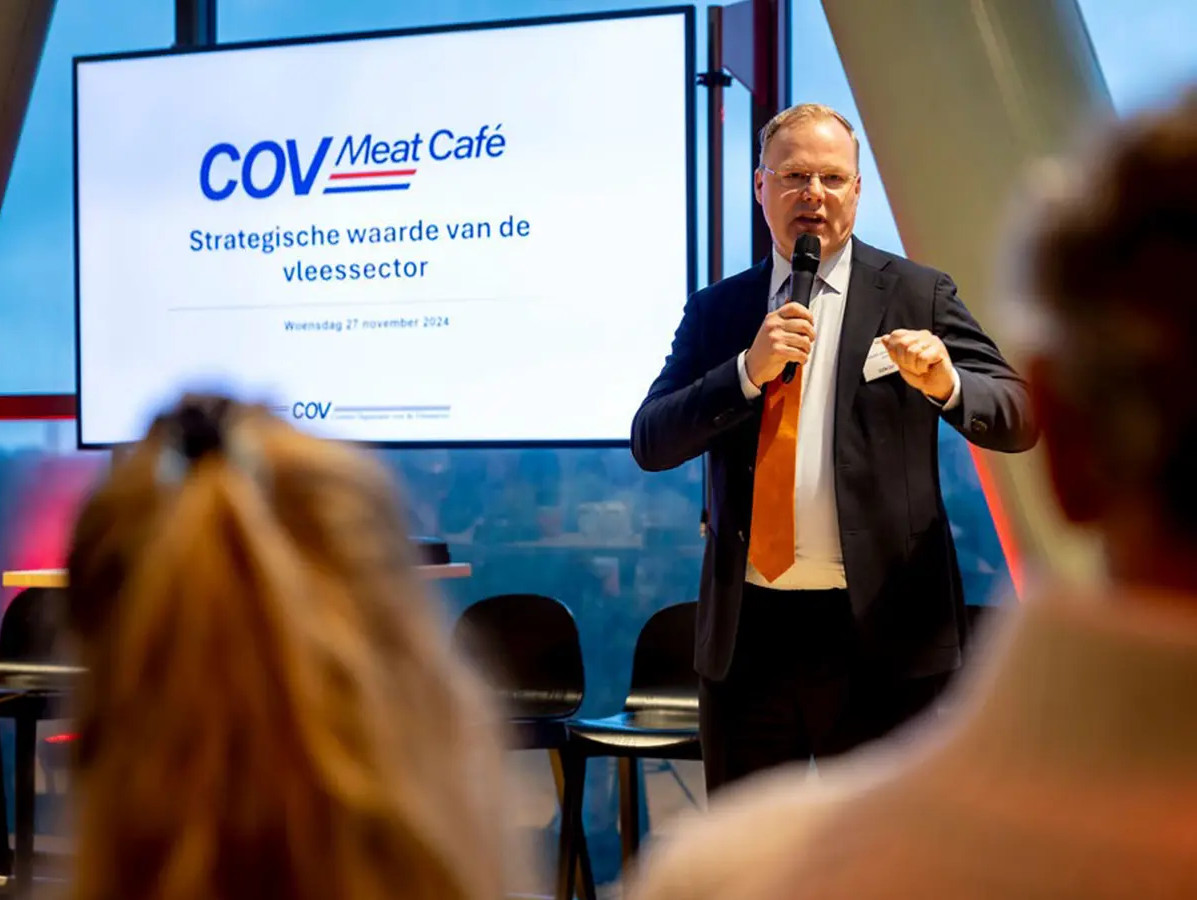
Should the government allow the meat sector more room, or should the EU's climate policy line take precedence? Is agriculture a strategic geopolitical asset for the Netherlands and the EU? For which market does the Dutch meat sector actually produce? And how does meat contribute to a healthy diet? These were some of the challenging questions discussed during the 7th edition of the COV Meat Café in The Hague.
The event brought together guests from agri-food, the Ministry of Agriculture, Nature and Food Quality (LVVN), Members of Parliament, and trade press representatives. Speakers included Arend Jan Boekestijn (Utrecht University, BNR), Martijn Rol (Rabobank), Isabel Boerdam (Green Food Lab), André Hoogendijk (BO Akkerbouw), and Laurens Hoedemaker, chairman of the COV (Central Organization for the Meat Sector). Moderator Marianne Zwagerman posed sharp questions following the presentations, sparking lively discussions among the audience.
“You are the solution to a terrible conflict,” began Arend Jan Boekestijn in his trademark rapid-fire style, exposing key issues in the geopolitical landscape. “China, with its critical minerals, holds a dominant position in the trade market. We in Europe are extremely dependent on that, which makes us vulnerable.” He highlighted the importance of strengthening our position, for example, by identifying China’s vulnerabilities. The answer, he argued, lies in focusing on food supply. Due to urbanization, pollution, and population growth, China must import significant quantities of food, making this a critical geopolitical asset. “Could food become a bargaining chip?” he asked. A key concern, however, is competition from Brazil, Russia, and North Korea, which are ready to step in as food suppliers. “We need every strategic advantage to maintain access to minerals and oil.”
COV chairman Laurens Hoedemaker underscored the importance of establishing a Dutch food strategy as a step towards a European one. “COV aims for strategic collaboration between government and industry, with innovation, market dynamics, and sustainability at its core.” He stressed that reducing food production would be irresponsible. “Food is one of the few export products the Netherlands still has. Without export, you’ll find yourself at the back of the queue when it comes to imports.” Animal products remain crucial, not only because of byproducts but also because most land is unsuitable for growing crops for human consumption. Plant-based proteins, he added, are harder for the human body to absorb compared to animal proteins. “Especially in the diets of the elderly, pregnant women, the sick, and growing children, animal proteins play an essential role in health.”
André Hoogendijk delved into history to shed light on today’s challenges and provide insights into the future. He showed how seemingly small decisions and changes can have major consequences. “Sometimes, we just don’t know how things will unfold.” One thing he does know is that decisions made in Brussels are incredibly important. Collaboration within the supply chain and sector is essential. “Can we see the Netherlands as one big mixed farm?”
After hearing various arguments supporting a strong meat supply chain, it was Isabel Boerdam’s turn to speak. Known as the “trendy vegetarian,” she advocated for reducing meat consumption per capita to lower the environmental impact. “In the Netherlands, we’re addicted to meat—it could definitely be less.” She called for greater urgency in addressing this issue. “It’s time for awareness. Stop greenwashing.” According to her, the meat industry needs a clear vision of its role in the food chain and must take steps to contribute to a better climate. “We must collaborate to solve this together.”
It’s clear: the Dutch food chain is undergoing a transition and seeking answers. Martijn Rol of Rabobank highlighted the global food challenge: “With a growing world population, we need to produce more—but with less impact. Many, whether in politics, society, or business, agree that food production must change. If we all want that, we have to be willing to pay for it.” He reminded everyone to focus on what the Netherlands has excelled at for decades: adding value. He emphasized the importance of intensive supply chain collaboration, stating, “We need to join forces to develop sustainable concepts, focusing much more on the long term.”
The central message was clear: there’s an urgent need for a European food strategy and collaboration—within the supply chain, with NGOs and governments, and across the EU. The debate about the value of the meat sector and livestock farming is currently too heavily influenced by opinions and emotions. While there’s some focus on the nutritional value of meat, its strategic importance is largely overlooked. The COV advocates for a clear food strategy.
Source: COV